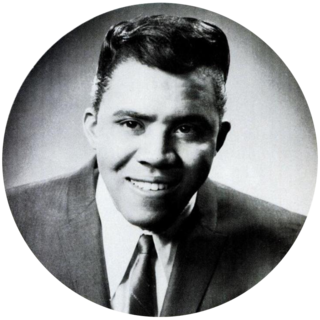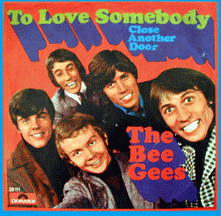Related Research Articles

Mathis James Reed was an American blues musician and songwriter. His particular style of electric blues was popular with a wide variety of audiences. Reed's songs such as "Honest I Do" (1957), "Baby What You Want Me to Do" (1960), "Big Boss Man" (1961), and "Bright Lights, Big City" (1961) appeared on both Billboard magazine's R&B and Hot 100 singles charts.

Jimmy Lee Ruffin was an American soul singer, and the older brother of David Ruffin, the lead singer of the Temptations. He had several hit records between the 1960s and 1980s, the most successful being the Top 10 hits "What Becomes of the Brokenhearted" and "Hold On ".

"Nights in White Satin" is a song by English rock band the Moody Blues, written by Justin Hayward. It was first featured as the segment "The Night" on the album Days of Future Passed. When first released as a single in 1967, it reached number 19 on the UK Singles Chart and number 103 in the United States in 1968. It was the first significant chart entry by the band since "Go Now" and its recent lineup change, in which Denny Laine and Clint Warwick had resigned and both Hayward and John Lodge had joined.
"I Got a Woman" is a song co-written and recorded by American R&B and soul musician Ray Charles. Atlantic Records released the song as a single in December 1954, with "Come Back Baby" as the B-side. Both songs later appeared on the 1957 album Ray Charles.

"Misty Blue" is a song written by Bob Montgomery that has been recorded and made commercially successful by several music artists. Although Montgomery wrote the song for a different artist in mind, it was brought first to the attention of Wilma Burgess in 1966. It was recorded by Eddy Arnold the following year, both versions were top 5 Country Hits. A decade later, blues artist Dorothy Moore released the highest-charting version of the song and it reached the top ten in several different radio formats. Following Moore's revival of the track, numerous artists re-covered the tune, including country artist Billie Jo Spears. Spears's version would also go on to become a successful single release. Numerous other artists and musicians of different genres have recorded their own versions of "Misty Blue". The song is now considered both a country music and blues standard.
"When Something Is Wrong with My Baby" is a soul ballad, written by Isaac Hayes and David Porter. It was first released in 1967 by Sam & Dave on their album Double Dynamite released on Stax Records.

"Turn On Your Love Light" is a rhythm and blues song recorded by Bobby Bland in 1961. It was an important R&B and pop chart hit for Bland and has become one of his most identifiable songs. A variety of artists have recorded it, including Them and the Grateful Dead, who made it part of their concert repertoire.

"To Love Somebody" is a song written by Barry and Robin Gibb. Produced by Robert Stigwood, it was the second single released by the Bee Gees from their international debut album, Bee Gees 1st, in 1967. The single reached No. 17 in the United States and No. 41 in the United Kingdom. The song's B-side was "Close Another Door". The single was reissued in 1980 on RSO Records with "How Can You Mend a Broken Heart" as its flipside. The song ranked at number 94 on NME magazine's "100 Best Tracks of the Sixties". The entry was a minor hit in France but reached the top 10 in Canada.
"Mona Lisa" is a popular song written by Ray Evans and Jay Livingston for the Paramount Pictures film Captain Carey, U.S.A. (1949), in which it was performed by Sergio de Karlo and a recurrent accordion motif. The title and lyrics refer to the renaissance portrait Mona Lisa painted by Leonardo da Vinci. The song won the Academy Award for Best Original Song in 1950.
"The Monkey Time" is a song written by Curtis Mayfield and performed by Major Lance. It reached No. 2 on the U.S. R&B chart, No. 8 on the U.S. pop chart, and No. 32 in Canada in 1963. It was featured on his 1963 album The Monkey Time, was arranged by Johnny Pate and produced by Carl Davis.

"I'm Your Puppet" is a song written by Dan Penn and Spooner Oldham; the best known version is the one recorded by James & Bobby Purify which reached #5 on the US R&B chart and #6 on the Billboard Hot 100 in 1966. The single was nominated for a Grammy Award for Best R&B Performance by a Duo or Group with Vocals in 1967. The song was featured on their 1967 album, James & Bobby Purify.
"Loving You" is a song written by Jerry Leiber and Mike Stoller and performed by Elvis Presley with backup vocals provided by The Jordanaires. It reached No. 15 on the U.S. country chart, #20 on the U.S. pop chart, and #24 on the UK Singles Chart in 1957. It was featured on his 1957 album Loving You. It was featured in Presley's 1957 movie Loving You. The single's A-side, "(Let Me Be Your) Teddy Bear" reached No. 1 on the U.S. pop, country, and R&B charts and #3 on the UK Singles Chart in 1957.
"Slip Away" is a song written by William Armstrong, Marcus Daniel, and Wilbur Terrell and performed by Clarence Carter, featured on the 1968 album This Is Clarence Carter.
"It's Too Late" is a song written by and performed by Chuck Willis. It reached #3 on the U.S. R&B chart in 1956. The song was featured on his 1958 album, King of the Stroll.
"Don't You Miss Me a Little Bit Baby" is a 1967 soul song originally recorded by Motown singer Jimmy Ruffin and released on the company's Soul subsidiary label.
"Don't Cry, Joni" is a song written by American country music artist Conway Twitty. He recorded it with his daughter Joni Lee and released it in August 1975 as the single from the album The High Priest of Country Music. The recording was a pop hit peaking at number 63 on the US Billboard Hot 100 chart and number 4 on the Billboard Country Singles chart.
"Why Don't They Understand" is a song written by Jack Fishman and Joe Henderson and performed by George Hamilton IV. It reached #10 on the U.S. pop chart, #22 on the UK Singles Chart, and #18 in Canada in 1958.
"With These Hands" is a song written by Benny Davis and Abner Silver and performed by Eddie Fisher featuring Hugo Winterhalter and His Orchestra. It reached number 7 on the U.S. pop chart in 1953.

"Ooh Poo Pah Doo" is a song written and performed by Jessie Hill. It was arranged and produced by Allen Toussaint. The single reached No. 3 on the Billboard R&B chart and No. 28 on the Hot 100 in 1960 although the charts list the B-side, instrumental "Ooh Poo Pah Doo - Part II", as the hit.

"Do You Really Love Me Too" is a song written by Mark Barkan and Ben Raleigh and first released by American pop singer Barbara Chandler as the flip side to "I Live To Love You" in October 1963. Originally called "Fool's Errand", it was renamed "Do You Really Love Me Too" on the UK release of the single in December 1963.
References
- ↑ "secondhandsongs.com". secondhandsongs.com. Archived from the original on August 19, 2013. Retrieved January 22, 2021.
- ↑ "Chuck Willis, "What Am I Living For" Chart Positions" . Retrieved September 3, 2018.
- ↑ TIMELINE OF MUSICAL STYLES & GUITAR HISTORY
- ↑ "Ernest Tubb, "What Am I Living For" Chart Position" . Retrieved September 3, 2018.
- ↑ "Conway Twitty, "What Am I Living For" 1960 Chart Position" . Retrieved September 3, 2018.
- ↑ "Percy Sledge, "What Am I Living For" Chart Position" . Retrieved September 3, 2018.
- ↑ "Conway Twitty, "What Am I Living For" 1971 Chart Position" . Retrieved September 3, 2018.
- ↑ "Ray Charles, "What Am I Living For" Chart Position" . Retrieved September 3, 2018.
- ↑ "Jack Scott, "What Am I Living For" Single Release". Discogs . June 1960. Retrieved September 3, 2018.
- ↑ "Ernie Freeman, "What Am I Living For" Single Release" . Retrieved September 3, 2018.
- ↑ "Carl McVoy, "What Am I Living For" Single Release" . Retrieved September 3, 2018.
- ↑ "Kitty Wells, Queen of Country Music". Discogs . 1963. Retrieved September 3, 2018.
- ↑ "Billy Fury, Am I Blue". Discogs . 1963. Retrieved September 3, 2018.
- ↑ "Wanda Jackson, Love Me Forever". Discogs . 1963. Retrieved September 3, 2018.
- ↑ "Millie Small, "Sweet William" Single Release". Discogs . 1964. Retrieved September 3, 2018.
- ↑ "The Everly Brothers, Beat & Soul". Discogs . 1965. Retrieved September 3, 2018.
- ↑ "The Animals, Animalisms". Discogs . May 1966. Retrieved September 3, 2018.
- ↑ "Rodger Collins, "Hands Off My Girl" Single Release". Discogs . 1967. Retrieved September 3, 2018.
- ↑ "Danny and The Velaires, "What Am I Living For" Single Release". Discogs . 1967. Retrieved September 3, 2018.
- ↑ "Z. Z. Hill, A Whole Lot of Soul". Discogs . 1967. Retrieved September 3, 2018.
- ↑ "Archie Campbell and Lorene Mann, Archie and Lorene Tell It Like It Is". Discogs . 1968. Retrieved September 3, 2018.
- ↑ "Solomon Burke, "Proud Mary" Single Release". Discogs . 1969. Retrieved September 3, 2018.
- ↑ "Wilbert Harrison, Let's Work Together". Discogs . 1969. Retrieved September 3, 2018.
- ↑ "Johnny Tillotson, Tears on My Pillow". Discogs . 1969. Retrieved September 3, 2018.
- ↑ "Andy Williams, "A Woman's Way" Single Release". Discogs . 1969. Retrieved September 3, 2018.
- ↑ "Bill Phillips, Little Boy Sad". Discogs . 1970. Retrieved September 3, 2018.
- ↑ "Lon Satton, "Someone is Standing Outside" Single Release" . Retrieved September 3, 2018.
- ↑ "Jimmy Capps, "Free Wheelin" Single Release". Discogs . 1972. Retrieved September 3, 2018.
- ↑ "Sonny James, "Surprise, Surprise" Single Release" . Retrieved September 3, 2018.
- ↑ "Little Joe Y La Familia Inc., "Paso Del Norte" Single Release" . Retrieved September 3, 2018.
- ↑ "Clarence "Gatemouth" Brown, Standing My Ground". Discogs . 1989. Retrieved September 3, 2018.
- ↑ "Carl Perkins, This Old House". Discogs . 1993. Retrieved September 3, 2018.
- ↑ "Taj Mahal, Phantom Blues". Discogs . 1996. Retrieved September 3, 2018.
- ↑ "Alan Price and The Electric Blues Company, A Gigster's Life for Me". Discogs . 1995. Retrieved September 3, 2018.
- ↑ "Jimmy Clanton, Go, Jimmy, Go!: The Very Best of Jimmy Clanton". AllMusic . Retrieved September 3, 2018.
- ↑ "The Band, Moondog Matinee". Discogs . Retrieved September 3, 2018.
- ↑ "Julie Hanify, David Mahler, and Larry Polansky, Too Late". Discogs . Retrieved September 3, 2018.
- ↑ "Van Morrison, Pay the Devil". Discogs . Retrieved September 3, 2018.
- ↑ "Gene Taylor Blues Band featuring Dave Alvin, Live!!! 605 Boogie!!!". Discogs . 10 November 2008. Retrieved September 3, 2018.
- ↑ "Dawn McCarthy and Bonnie 'Prince' Billy, What the Brothers Sang". Discogs . 19 February 2013. Retrieved September 3, 2018.
- ↑ "Pine Leaf Boys, Danser". Discogs . 31 May 2013. Retrieved September 3, 2018.
- ↑ "Doyle Lawson & Quicksilver, Life Is a Story". Discogs . 25 August 2017. Retrieved September 3, 2018.